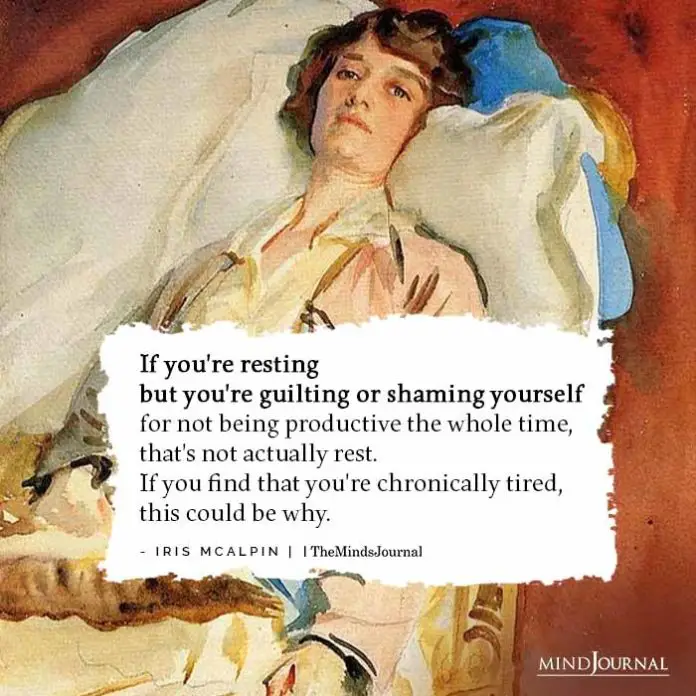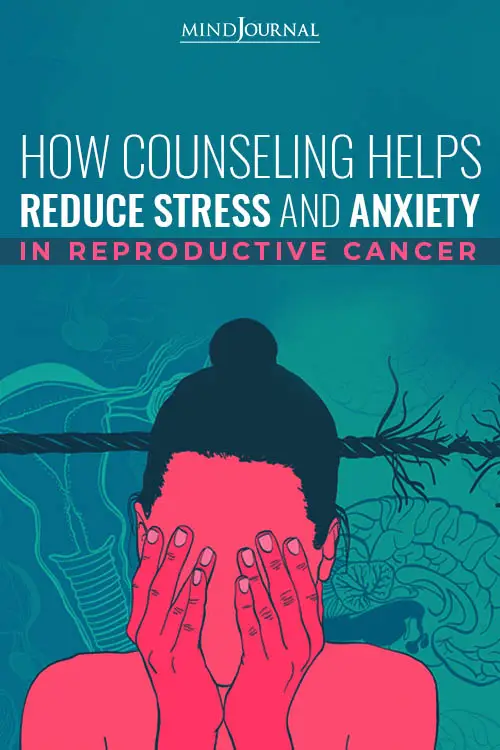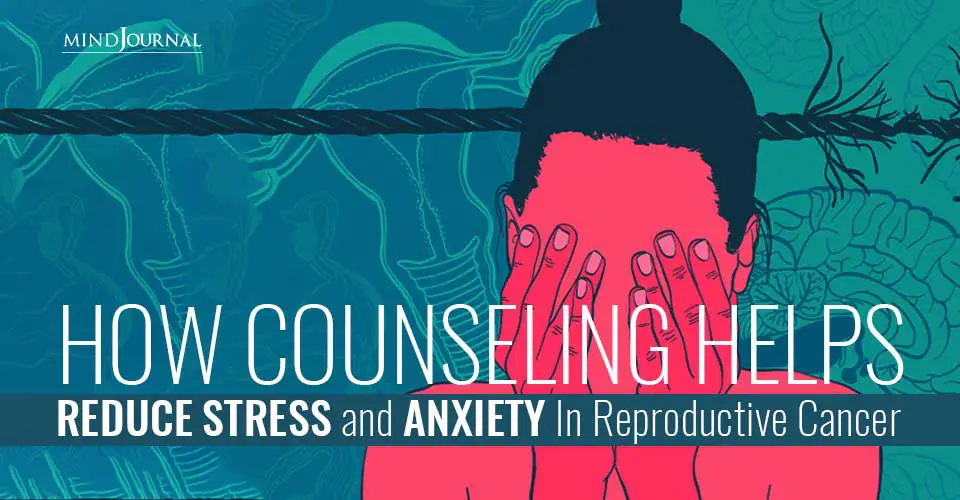Mental Health counselling to reduce stress and anxiety in reproductive cancer!
The emotional effects of the stress and anxiety caused by cancer treatments, especially for women suffering from reproductive cancers,
are often not adequately addressed by healthcare providers. Up to 58% of individuals with cancer have issues with depression, compared to
7.6% of the general population.
Forty-five per cent of women with gynaecological cancers experience Post Traumatic Stress Disorder (anxiety, sleep issues, worry and concern, hyperfocus on symptoms, fear, among others) and compounded by the blame they place on themselves for their use of birth control or smoking early in life.
According to the National Cancer Institute, nearly 41% of survivors of breast cancer – also considered reproductive cancer because many
with the BRCA gene also develop ovarian or uterine cancers – have a sub-clinical presentation of PTSD; while they may not meet all the
criteria for a full diagnosis, they still suffer from the intense fear and helplessness associated with PTSD.
Despite these alarming statistics, most women do not receive mental health counselling as part of their cancer treatment program. Although
many do get emotional support from their spouses, families and other cancer survivors, the guidance of a trained mental health professional
would provide a very different perspective.
A mental health counsellor or therapist can and often does provide invaluable support, and emotional and nonjudgmental space as well as
healthy skills and strategies to manage symptoms.
Stress and anxiety related to reproductive cancer treatment often lead women to skip treatments and blood draws. This leads them to be
perceived as difficult by their doctors, but their non-compliance is really an avoidance behavior to cope with the stress associated with the treatment. And although they know they shouldn’t skip their treatments, avoidance and fear keep many women from doing just
that.
Related: 10 Hidden Anxiety Triggers You Need To Avoid
And if an oncologist recognizes this problem in one of his or her patients, the protocol is to send the patient to her primary care physician
for anti-anxiety or anti-depressive medications. This only adds another doctor’s appointment the patient does not want to attend, and more
medication she does not want to take. Once again, this makes women feel even more shame and increased avoidance.
“I see a significant need for counsellors to be trained in how to work with people with cancer, especially women with reproductive cancers
because they have very unique needs,” says Linda Waters, a Licensed Professional Clinical Counselor Supervisor. “People with cancer are
living a lot longer, and they must deal with physical and mental health issues throughout their lives.”
Waters is pursuing her doctorate in counsellor education at the University of Toledo. As part of her research, she is studying the impact
of female reproductive cancers on mental health.
Here are seven specific reasons women with female reproductive cancers develop mental health issues that could be positively addressed
by a professional mental health counsellor.
1. Loss of Fertility and Sex Drive
Young women with reproductive cancers who still want to have children can often be put into early menopause by cancer treatments, which also greatly reduce sex drive, both of which can cause great angst in relationships. To boot, reproductive cancer survivors are often
not eligible for hormone replacement therapies to alleviate the symptoms of early menopause. “For many women, hormone
replacement drugs are not indicated for estrogen-positive cancers,” Waters explains. “Even an estrogen cream that would help with
lubrication could fuel cancer recurrence.”
Related: 5 Healthy Ways to Move On From a Relationship
2. Body-Image Issues
As a result of treatment for female reproductive cancers, women can have scarring from mastectomies and other surgeries, internal scarring from radioactive seeds, intense burns or changes in skin texture and appearance from radiation or drugs, and swelling of limbs due to the removal of lymph nodes that necessitates the wearing of compression bandages. Mental health counselling can help women learn to love and accept their new bodies and view their scars as signs of strength.

3. Loss of Role
Many women are not used to being the centre of attention in their family unit. They are the caregiver, not the focus of caregiving. Women often withhold their emotional experience with cancer because they don’t want their spouses to worry about them. This can
add another layer of avoidance and that exacerbates stress and anxiety.
Related: From Fantasy To Reality: The Bitter Truth About Affairs
Waters also says that the general push to maintain optimism will prevent women from sharing their experience with people outside the
family unit. “People often say, in a simplistic way, ‘Just be positive.’ So if I share that I’m struggling or that I’m afraid of dying, and you want me to maintain optimism, that shuts down the conversation,” she says.
4. Financial Strain
In many cases, women also manage family finances. Gynaecological cancers, which are among the most expensive cancers to treat, drain bank accounts and cause financial uncertainty and additional stress.
According to NPR, in 2013, 25% of cancer patients chose not to fill a prescription due to cost, and one in eight cancer patients rejected treatment for financial reasons. Additionally, mental health counselling can be viewed as a luxury expense, and therefore is not often
considered.
5. Facing Mortality
Research says that women’s main concerns during cancer treatment are how their family is being affected and how their family may be
affected when they are gone. “My research shows that even women with earlier-stage cancers that are still curable and treatable are facing
their own mortality in ways they never have before,” Waters says.
And while hospice counsellors are available for those with late-stage cancers and can help attend to the needs of children, women with earlier-stage cancers are left to manage the process on their own. For that reason, the risk of suicide for those who experience cancer is twice that of the general population.
6. Cancer-Related Pain, Fatigue and Sleep-Disturbance
“If I get a bump or bruise soreness in my hip, I think, ‘Gosh, what did I hit?,’” says Waters. “But if you’ve had cancer, you think, ‘Oh my gosh, is
it coming back?’” Cancer survivors suffer from pain that if left uncontrolled, can contribute to depression and substance abuse
disorders. Fear of cancer recurrence (FCR) can cause cancer-related fatigue and sleep disturbance, which can make women
feel disconnected from their families and friends.
Cancer-related fatigue is not often a result of lack of sleep and is more often cured with light exercise over rest. Only a mental-health
counselor trained to work with cancer patients would have all the information needed to truly help.
Related: 10 Secret Areas Where You Store Stress In Your Body
7. Support Groups Aren’t for Everyone
Support groups can be wonderful, but they often create additional mental health stressors for participants. Not every person responds
positively to support groups. It is an individual choice. “If you have supportive friends and family, and you go to a group where
people talk about how their friends and family have let them down, it can be distressing,” Waters explains.
“In addition, as the illnesses of members of the group progress, you can experience grief from the loss of those who were supportive to you, and you can experience survivor’s guilt.”
To the contrary, if a woman with cancer were seeing her own therapist, the sessions would be focused on addressing the issues and problems
specific to her. This would again, encourage personal growth with a focus on self to address the complicated issues surrounding her cancer.
Related: 7 Superfoods That Prevent The Growth Of Cancer
Waters’ long-term goal is to develop a non-profit cancer counselling fund so those with cancer can receive counselling at no cost. Because
those with cancer report that their mental health needs are often unaddressed during their treatment, she also hopes to train mental
health counsellors specifically to work with people with cancer and oncology providers to consider the mental health aspects of cancer.
In the meantime, however, if you believe you or your loved one with cancer may need professional assistance navigating the mental health
challenges of cancer, reach out to a trained counsellor or therapist. They are here to help. They are able to help each individual draw on personal
strengths and support systems and can give life perspective to guide you or your family during this difficult and challenging time. The time to
focus on yourself and your health is now.
Your primary care provider can provide a referral to a private counsellor or community mental health agency for counselling tailored to your
needs.
Are you ready for mental health counselling to beat stress and anxiety in reproductive cancer?
Written by: Dr Kristin Davin









Leave a Reply
You must be logged in to post a comment.